4 Common Elderly Cat Health Problems
Are the most common elderly cat health problems preventable?
The answer, in some cases, might be yes.
Some of the causes of certain diseases seen in older cats are related to how you care for your cat, say veterinarians. Others may be related to the environments our cats live in, our homes.
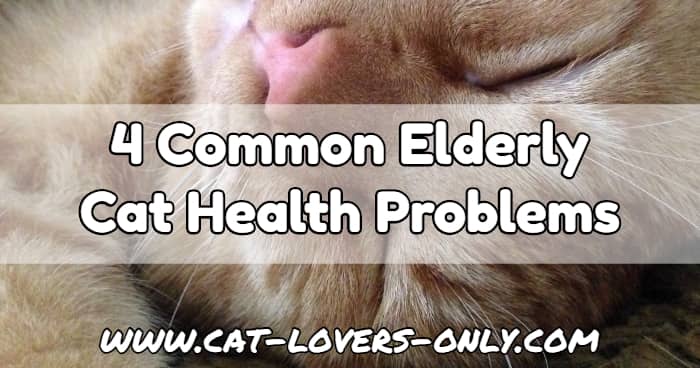
For example, do high carbohydrate diets and feeding dry food lead to diabetes?
Do chemicals in the home have a big impact on your cat's health later in life?
Let's have a look at the signs, symptoms, and causes of some of the most common problems seen in senior cats.
We'll also take a look at what some experts say is the fix for some of these problems, if one exists.
One cat health expert claims that diet or environment may be responsible, at least in part, for some illnesses in older cats. Based on the research done over the last few years, other veterinarians agree.
Health problems in cats, as with people, come with age, but...
"We also have to add to this list a number of unnatural diseases caused by how we care for our cats."
-Elizabeth Hodgkins, DVM Feline Wellness
The 2008 Fall/Holiday edition of Feline Wellness featured an article by Ocicat breeder and veterinarian Elizabeth Hodgkins of All About Cats Health Center in Yorba Linda, California called "The Big Four." The article discussed the symptoms and causes of four of the most common elderly cat health problems.
They are:
- Obesity
- Diabetes mellitus
- Hyperthyroidism and
- Feline chronic kidney insufficiency (CRI, CRF, and CRD).
Three out of these four senior cat diseases may be caused by, or exacerbated by, an unnatural feline diet, high in over-processed carbohydrates. The fourth one may be caused by chemicals in the environment or in commercial cat food.
You'll notice that many diseases have overlapping symptoms, so skilled veterinary care and keen observation is critical.
That Darn Cat Physiology
Cats are not humans. That darn feline biology means that even if you and your cat are exposed to the same environment, the same chemicals, the results may be different.
And, when was the last time you stepped in something and licked your feet clean? If my feet get dirty, I wash them. If your cat's paws get dirty, she licks them until they're clean, leaving her liver and kidneys to work out the details.
Also, humans are omnivores, but cats are obligate or strict carnivores. They require high levels of animal based protein for good health. Dry cat food, on the other hand, is packed full of carbohydrates, which experts would say normally would only make up five percent of a cat's natural diet.
Is it possible then the very loving home you provide for your cat, including that tasty kibble, may end up making her sick?
#1) Feline Obesity
Veterinarians say that many of our domestic furriends are overweight, and obesity in cats is widespread. Dr. Hodgkins says that in the process of protecting our domesticated friends, we've also failed to provide them with a proper diet.
She says that instead of feeding your cat an unnatural diet of "cheap, poor quality over-processed cereal" you should switch your cat to either a homemade diet or a high quality wet canned food supplemented with meat and dairy.
Symptoms include: A fat cat, possibly low activity levels.
According to the Winn Feline Health Foundation, overweight cats are at higher risk for diabetes, skin conditions, and hepatic lipidosis, a life-threatening liver disease. In addition, the Winn Feline Health Foundation reports that "studies have shown obese cats are five times as likely as cats of normal weight to develop lameness requiring veterinary care."
Cause: Lack of activity and exercise, improper diet, over-eating.
Fix: More exercise, and a high quality canned food or homemade diet.
Recommendations to increase calorie burning activities include using climbing furniture to make use of vertical space, multiple feeding stations throughout the house, food delivery toys, and play sessions.
Dr. Shawn Messonnier says that you can either cook for your pet, or feed one of the brands of cat food that he recommends.
If you're interested in comparing, I've put together a list of resources on vet recommended cat foods for your reference. Click here for information and resources on homemade cat food recipes and here for a list of some top brands of cat food.
Many of us don't even realize our pets are overweight. For more on how to spot this condition, and recommendations on how to help your cat slim down, see healthy cat weight. Read more on feline obesity.
It should be noted that not all veterinarians believe that the type of food is the major culprit. Some say the evidence is not clear, and it may simply be a matter of calories in and calories out.
Exercise and how you feed may be at least as important as what you feed.
#2) Diabetes Mellitus
Some people are surprised to learn that diabetes in cats not only occurs, but is a fairly common elderly cat health problem. Classic feline diabetes symptoms include excessive thirst and urination.
This is one reason why it's a good idea to pay attention to your cat's normal routines. That way, you'll know if she starts drinking and urinating too much. Diabetic cats may be overweight, or they may lose weight while seeming to eat plenty of food.
Symptoms include: Excessive thirst and urination, weight loss, lethargy, vomiting, poor coat appearance.
Cause: Like obesity in cats, the diabetes epidemic is often blamed on a low quality, starchy diet. Too much sugar is worse for kitties than it is for humans, says Dr. Hodgkins, since cats are obligate carnivores. Their bodies need protein from meat, not carbohydrates from sugar.
Although the exact cause is unknown, the disease more often occurs in older, obese male cats. Genetics and obesity may play a part. What is known is that lack of activity and high consumption of carbohydrates or over-eating have a negative impact.
Fix: Some cats may be able to reduce or eliminate their need for insulin through increased exercise and a low carbohydrate diet. Read more on diabetes in cats.
#3) Hyperthyroidism
Another of the common elderly cat health problems is feline hyperthyroidism, or benign thyroid hyperplasia. International Cat Care, the charity formerly known as The Feline Advisory Bureau, says that hyperthyroidism is rarely seen in cats under less than seven.
"Hyperthyroidism is usually seen in middle-aged and older cats, rarely being seen in cats less than 7 years of age."
To add to that fact, Dr. Hodgkins says that overactive thyroid is "by far the most diagnosed disease of cats in their middle and senior years" and recommends a thyroid panel yearly for cats over 10 years of age.
Symptoms include: Excessive thirst and urination, unexplained weight loss, lethargy or hyperactivity, loss of appetite or excessive appetite, vomiting, and loose stools. Unfortunately, these symptoms are common to many diseases.
Cause: Unknown. Research shows that hyperthyroidism may be caused by products in the environment (fire retardants, carpet treatments, etc.). These are chemicals which many house cats are heavily exposed to on a regular basis.
Some veterinarians suspect additives in commercial pet foods may be to blame as well. If any of that's true, then environmentally friendly products and better foods with reduced chemicals are the prevention.
Fix: According to the Cornell Feline Health Center the treatment of choice is radioactive iodine therapy, which is effective in 95 percent of cases.
More information on hyperthyroidism in cats.
#4) Chronic Kidney Disease
Chronic kidney disease goes by several names. Susan Little, DVM, writes that chronic renal insufficiency (CRI) in its most severe form is referred to as CRF (chronic renal failure). Chronic renal disease (CRD) covers the whole shebang. (Chronic Kidney Disease)
Symptoms include: Overlapping symptoms with other elderly cat health problems, such as diabetes. Those symptoms include weight loss, increased thirst and urination, vomiting, and loss of appetite.
Testing is needed to determine an accurate diagnosis. If your cat exhibits any of the signs, you'll want to get your vet involved for testing. For cats over the age of seven, some vets may want to begin doing blood tests annually.
Here's an extensive list of Feline CRF symptoms and information.
Cause: The exact cause of the disease is unknown, although a number of cat health experts are expressing their suspicion that diet is at least a contributing factor.
Elizabeth Hodgkins is among them. While some breeds are predisposed to CRI, Hodgkins tells us, an "over-processed low protein diet lacking in fresh ingredients and antioxidants is likely to be at least part of the problem."
Fix: This is a degenerative and progressive disease. If your cat is diagnosed early enough, however, with proper treatment she can live many years after diagnosis.
Treatment will depend upon what stage the disease is in, but may include IV or subcutaneous fluids and management of blood pressure.
Dr. Hodgkins warns that low protein diets are still sometimes used to manage CRI, but have not been proven effective. In fact, high-carbohydrate dry cat food may dehydrate your cat, and actually contribute to the disease.
Canned cat food is recommended, especially since it has a high water content, and hydration is essential. If your cat has become dry food addicted, however, it may be difficult to get her to switch.
This is one reason why I feel it's important to offer cats a variety of foods and food types as early as possible in life. If a cat has been stuck on one brand or one type of food all their life, it's harder to get them to accept a change in diet.
Kidney problems are one reason why, no matter what your cat's age, you should do what you can to make sure your cat drinks plenty of water.
More information on chronic renal insufficiency.
Cat Illness Symptoms
Cat Lovers Only
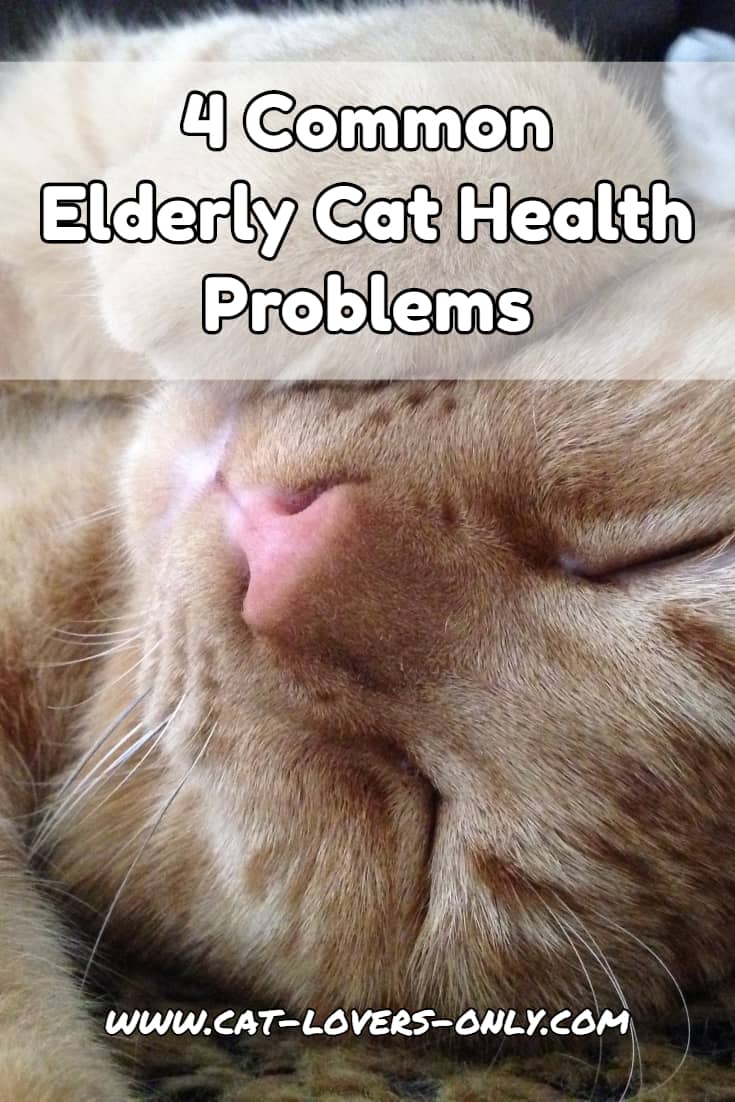
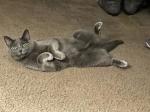
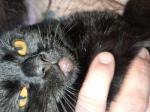
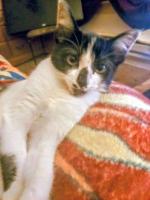
Comments: What do you think?
Have your say about what you just read. Leave me a comment in the box below.